Want to lose weight? Eat healthier? Feel better? Have more energy?
Of course you do.
But if you’re looking for that elusive golden unicorn that pisses diamonds and farts rose petals, you’re not going to find it in a bullsh*t infomercial gadget, miracle diet, “teatox,” body wrap, or so-called Instagram influencers.
You know what I mean. You bounce from one fad diet to the next, buy every infomercial gadget, and gulp down “metabolism boosters” and “fat burner” supplements, hoping that maybe, just maybe, THIS one is REALLY going to work….which it never does.
Still with me?
I know, it’s tough to think otherwise when your social feeds are overflowing with self-proclaimed “celebrity” nutritionists, personal trainers, and health coaches spruiking the next latest greatest pill, diet, or exercise routine.
“Revolutionary thermogenic formula! Optimised macros! Dynamic inertia! Gyrotronic resistance! 28 day fat blaster challenge! 5 minute abs!”
Convincing?
Yeah, because that’s what health marketing does. It misrepresents science, celebrates the mundane, and embellishes barely legal marketing claims to sell you sh*t you really don’t need.
Two words: golden unicorn.
The secret to health is no secret
Want a real golden unicorn that DOES work and is evidence-based?
Granted it’s not sexy, but you’ll find it in the age-old scientifically proven advice your sage grandfather might have given you:
- Eat more fruits, veggies, and high-fibre whole grains. Less burgers, chips, and processed sugary crap
- Move. Often. Do a mix of exercise and incidental activity throughout the day
- Get adequate sleep
- Get adequate sunlight
- Drink in moderation
- Don’t smoke
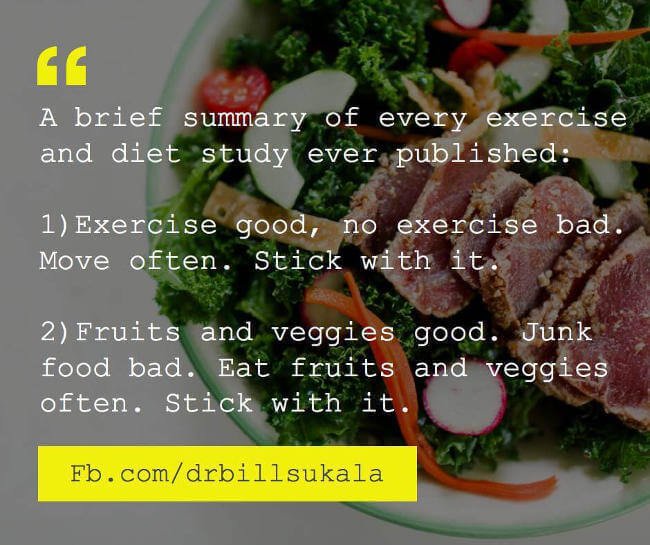
Beware the golden unicorn salesman
There is no limit to the useless sh*t marketers will try to sell you and the lengths they will go to accomplish that end.
And guess what? In their eyes, you’re the easy mark. The low hanging fruit. You’re the sucker and your wallet is their target.
Their mantra is always the same: “whatever people are buying, I’m selling.”
Their business is money. Their storefront is health, fitness, nutrition, or whatever.
Do they actually care about your health?
Unlikely.
Can they really be bothered to think about your health when they’re too busy counting cash grifted from gullible people desperate to believe in elusive diamond-pissing golden unicorns?
Ethics? Huh? Wha…?
Sure, they’ll use lame apologetic excuses like “well hey, anything that gets people off the couch is a good thing, right?“
Uh huh. Yeah, sure buddy. Whatever helps you sleep at night.
Species of golden unicorns
As you have seen, there are a variety of golden unicorn species out there and the only way to protect yourself is to know and understand their natural habitat and behaviour.
The following list is by no means exhaustive, but will prepare you for when you come face to face with some of the more common diamond-pissing golden beasts.
Bullshiticus infomercialis
Infomercials. The scourge of late night TV – and now social media.
They come with fancy names like the Ab Circle Pro, Ab Wave, SpinGym, and Shake Weight.
You know the rest.
“Don’t delay! Lose weight NOW for the incredibly low price of $199.95! That’s right, just $199.95 for the BODY OF YOUR DREAMS! But WAIT! That’s not all you get! Act now and we’ll throw in a golden unicorn pissing diamonds!“
Back in 2010, I authored a comprehensive review of the Ab Circle Pro‘s deceptive advertising.
I was so viscerally furious about the sheer number of false and misleading claims, I transcribed the entire 10-minute infomercial and then categorically dismantled each claim through the lens of exercise science.
The article generated a lot of buzz in the media and resulted in my being interviewed by a number of international TV and radio stations, as well as print and digital publications.
The regulatory agencies eventually caught up with the Ab Circle Pro in Australia and New Zealand and forced them to amend their ads for making deceptive claims (i.e., if “results are not typical” then they’re misleading).
The final coup de grâce came in August of 2012 when the US Federal Trade Commission fined the company $25 million for making false claims, which contributed to the company going out of business.
The moral of the story is that the Ab Circle Pro is not unique and is only one drop in an ocean of dodgy infomercial products.
They all use the same regurgitated formulaic advertising (i.e., hammer on your pain points and insecurities, make grandiose promises, feature hired fitness models who’ve never used the product, add in weepy overacted “testimonials,” and repeated calls to action to buy now!) over and over and over again.
Why? Because it’s marketing and it works.
When one golden unicorn runs its marketing cycle, the makers recycle the same tactics and invent a “new and revolutionary” golden unicorn.
And the end result is always the same. You’re lighter in the wallet, fatter than you were before, and the ab blaster piece of sh*t ends up on your sidewalk waiting for Tuesday morning garbage collection.
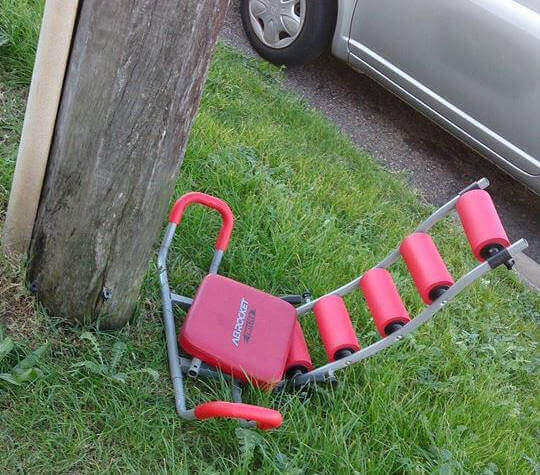
Bottom line
Golden unicorn infomercial pushers are bottom-dwelling scum who cannot sell their wares by honest means. Please do NOT be just another gullible sucker falling into their sales funnels. You are a dollar sign to them, nothing more, nothing less.
Bullshiticus miraculus dieteticus
Bullsh*t diets have been around for centuries and, like infomercials, there’s no limit to the variety of names or wacky regimens.
How do you know if the diet you’re following is a golden unicorn?
Nine times out of ten, its name fits this syntax: The <Fill in the Blank> Diet.
Here, let’s take a look at some real diet Hall of Shamers.
- The HCG Diet
- The Cabbage Soup Diet
- The Grapefruit Diet
- The Alkaline Diet
- The Blood Type Diet
Tried any of these?
Did you lose weight?
Of course you did.
Losing weight is easy when you starve yourself on 500 calories or less per day.
How long did you last on the diet?
One week? Two weeks? Maybe you ran the gauntlet and lasted a full month.
Bravo.
Then what happened?
You eventually said “f*ck this, it’s too hard.” You threw in the towel, went out for a burger, and then scolded yourself for being a failure.
But here’s the thing: you didn’t actually fail the diet. The diet failed you!
When you go from eating 3000 calories down to 500 calories or less per day, your body’s internal physiology and biochemistry goes, “sweet baaaaby Jesus, the famine has arrived!!“
Thing is, your body is a lot smarter than any fad diet that ever was or ever will be. You see, your body has a built-in famine response mode to protect you from yourself and idiotic diets.
You might think you’re speeding up your metabolism but, contrary to your wishes, starving yourself actually slows down your metabolism. Your body wants to conserve as much energy as possible, which includes holding onto valuable life-sustaining body fat, because it has no idea how long this famine is going to last.
You might be thinking, “well, wait a minute. How come I lost weight if my body is holding onto fat? That doesn’t make sense to me.”
It’s because you didn’t lose fat, or not that much anyway.
One of the first things you lose on a starvation diet is your muscle glycogen and the water bound to it.
*Glycogen is just a fancy name for stored carbohydrate. It’s stored mainly in your muscles and your liver. (FYI, if you’re scared sh*tless of carbs, read my article Carbohysteria).*
Next, your body begins to break down it’s muscle tissue. This is bad – really bad.
Muscle is your body’s rock star tissue. Muscle is metabolically active and burns more calories than fat tissue per equivalent weight. In other words, it pays a higher metabolic rent in the body to earn its keep.
Not only that, muscle, particularly well-conditioned muscle from regular exercise, protects you from things like heart disease and diabetes by effectively siphoning sugar and fat from your bloodstream and burning it for energy (instead of floating around your body where it can wreak havoc).
Rule: muscle good. No muscle bad.
Fat tissue, on the other hand, is something of a metabolic freeloader… but in a benevolent tough love sort of way. It’s a rich source of valuable energy and burns comparatively fewer calories to earn its keep in the body – which is valuable for keeping you alive during a real famine or prolonged stupid diet.
If you’re starving yourself while on a high protein diet, then you might lose even more weight from peeing out all the excess nitrogen.
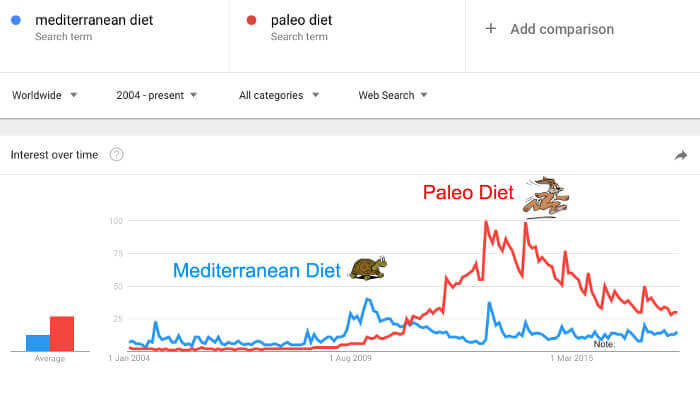
If you go into ketosis, then it’s going to be tough (REALLY tough!) to stay on the diet for any length of time because ketones are sort of your DEFCON 1 emergency fuel. Eventually you’ll collapse or get tired of having disgusting smelling breath.
*FYI, check out my related article Fat Burns in the Flame of Carbohydrate
After several weeks of starving yourself on The Golden Unicorn Diet, yes, you may have “lost weight” on the scale, but you definitely haven’t lost as much fat as you think you did.
Tale of the DEXA scan
Last year, I ran before and after DEXA scans on a couple that was doing a so-called “weight loss challenge” at their local gym. They told me they were on a high-protein diet and were exercising six to seven days per week.
When they came back in for their follow-up scans six weeks later, they were smugly bragging about how much “weight” they lost, but the DEXA scan showed them the ACTUAL COMPOSITION of that weight loss.
They each lost a TRUCKLOAD of muscle and, to their astonishment, a comparatively small amount of fat. In fact, because they lost so much muscle, their body fat percentages had actually gone up!
And they were worse off for it because they had lost so much valuable metabolism-stoking muscle.
So what happened? They were under-eating, over-training, and under-recovering.
Bottom line
Focus on slow steady FAT LOSS instead of nebulous golden unicorn goals like “losing weight” or “getting results.” Steer clear of popular diets your friend Britney and Aunt Gertrude are doing and arm yourself with these 13 principles for safe, effective, and permanent fat loss.
Bullshiticus teatoxium
The market is flooded with all kinds of “teatoxes” which come with all kinds of outlandish health claims.
But what gives? Can you REALLY “detox” yourself into “losing weight” or “cutting the bloat?”
No. It’s physiologically impossible.
It’s not possible because it’s not “toxins” that are causing you to be overweight in the first place.
But you might argue, “What do you mean? I ‘lost weight‘ on a ‘teatox.'”
In my Skinny Teatox, Flat Tummy Tea, Skinnytabs, and SkinnyMint Teatox review articles, I point out that these types of products are, in actual fact, nothing more than exorbitantly overpriced diuretics and laxatives.

Get ready to piss and sh*t….a lot…because you and your toilet are about to become good friends again (like back in your university days, downing 11 beers, 5 tequila shots, and a bottle of chardonnay every Friday night).
In an article on Science-Based Medicine, Scott Gavura eloquently provides a real definition for detox:
“Detox” is a legitimate medical term that has been co-opted to sell useless products and services. It is a fake treatment for a fake condition. Real detoxification isn’t ordered from a menu at a juice bar, or assembled from supplies in your pantry. Real detoxification is provided in hospitals under life-threatening circumstances — usually when there are dangerous levels of drugs, alcohol, or other poisons in the body. Drugs used for real detoxification are not ingredients in a smoothie.
Still with me?
Thing is, these “teatoxes,” aside from making you piss and sh*t all day long, often recommend that you improve your diet to, you know, “synergistically enhance the effects of the teatox.”
And I won’t argue, eating better is definitely a good thing and is precisely what any responsible health professional would recommend. But you don’t need to waste your money on overpriced laxatives and diuretics to achieve good health.
Bottom line
Stay alert and don’t fall for the cutesy teatox advertising or the photoshopped Instagram pics. Remember, the business is money and the storefront is health.
Bullshiticus corpus wrapum
Body wraps.
Have you seen “those crazy wrap things?”
You know, the ones where you smear a herbal concoction over your fatty areas, cover yourself plastic wrap, and whammy, you’re thinner!?
I know, kinky right? But hey, who am I to judge…if you’re into that sort of thing?
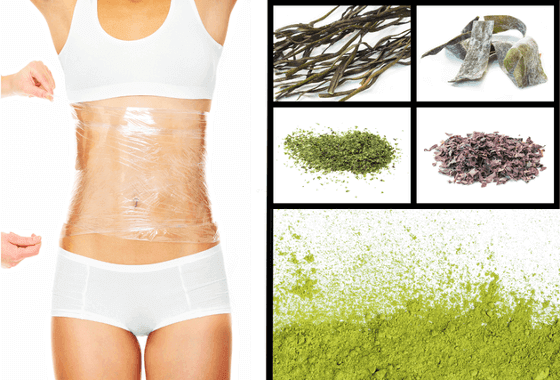
Yes, body wraps have been around for quite a number of years and, like bell bottom jeans and bad haircuts, this golden unicorn keeps coming back.
Can you really “melt away the fat” from those trouble spots with a body wrap?
In a word: no.
Fat doesn’t just melt away through the skin. You need to improve your eating habits and become more physically active.
Sure, you might “lose weight” or see brief cosmetic improvements from a body wrap. However, this is more of a temporary illusion than any lasting effect.
While you may see small reductions in scale weight or inches on the tape measure, the actual composition of your weight loss is not body fat.
By the very nature of being wrapped in plastic (and sometimes heated), you will “lose weight” through sweating and dehydration.
Bottom line
The concept of “spot reduction” has long since been debunked. You cannot melt away fat through the skin. Once you leave the spa and consume food and water, you will replace what you lost in sweat weight.
For more information on body wraps, please see my general body wraps article It Works wraps review.
Bullshiticus Guru Instagramicum
I’ve been doing consumer advocacy work in the health space for well over two decades now and never in my entire career have I seen a bigger cesspool of health misinformation than on Instagram.
I’ll admit, Facebook and Twitter are quite prolific on the douchebaggery scale, but Instagram is a particularly onerous place for someone looking for reliable, trustworthy, and responsible health information.
What do I mean?
Think all of the above: teatoxes, 28-day fitness challenges, diets, fake testimonials, airbrushed images, micro-targeted advertising. It’s all there, on your phone, in your face, in 3D, in full colour.
If you’re a a teenage girl or young adult woman reading this, please know that Instagram is a great place to inspire an eating disorder (#fitspo). It has been studied and linked to poor mental health outcomes.
First, in the quest to rise above the social static and noise, Instagrammers are going to great lengths to image craft and mould their feeds. What you’re seeing is not reality. It’s a carefully coordinated effort to enhance their “personal branding” and social influence.
Second, the “health advice” your getting is, in most cases, questionable. “Influencers” are now getting paid to say a “teatox” was the secret to their success. Spoiler alert: it wasn’t.
Third, the images you see are often distortions of reality. Some Instagrammers have had surgery, botox, and treatments to make them look like a top-heavy mannequin. The photos are often professionally done, with certain looks accomplished by altering angles, using different lighting, playing with after-effects filters, or, if all else fails, airbrushing in Photoshop.
Aside from social media’s distorted aesthetics, sometimes information can be downright, well, just plain idiotic.
Last year, a young Australian “health coach” named Olivia Budgen when down in a media firestorm for saying that “cancer and disease is your body trying to save you.”
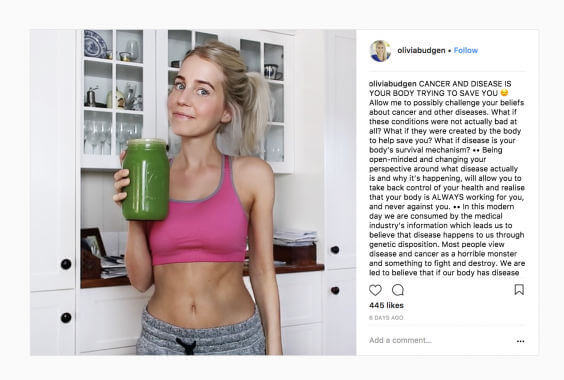
She eventually deleted the Instagram post under intense media scrutiny. Then, in a so-called apology video on YouTube, Olivia blamed everyone else for misunderstanding her. To add insult to injury, she doubled down and had the audacity to spruik her ebooks below the video.
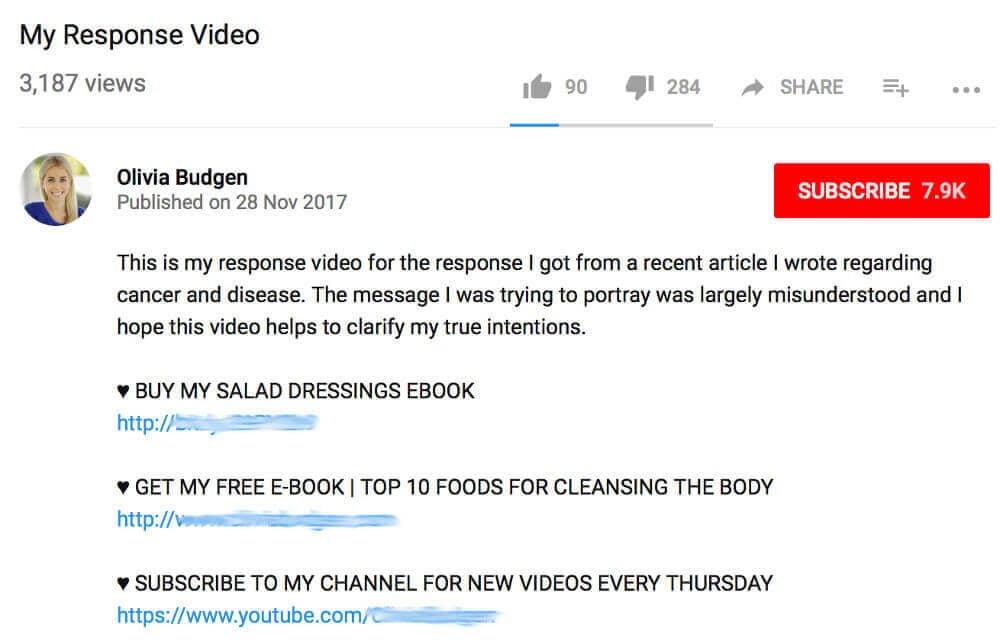
In the video, she cited a well-known cancer quack as the source of her comments. Based on her responses to comments, the only thing she appeared to be sorry for was getting called out (below).
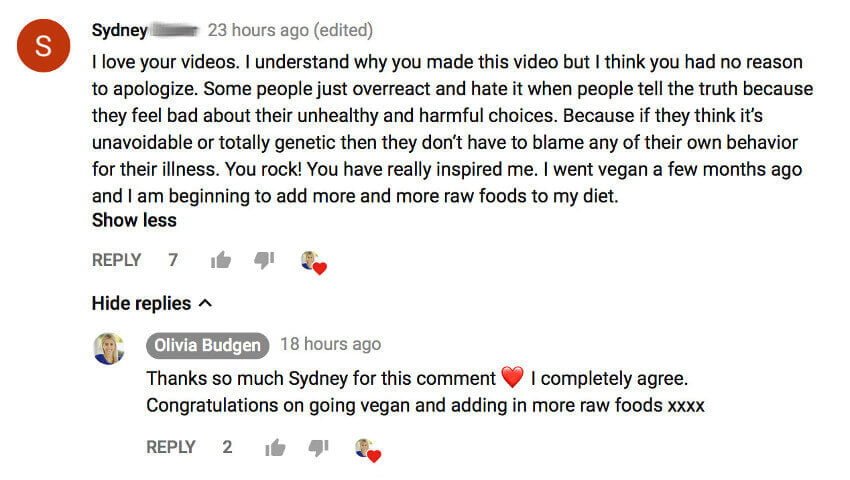
Bottom line
Social media has given a platform and voice to everyone, irrespective of whether or not they’re qualified to give health advice.
If your Instagram feed is plastered with “detoxes,” “cleanses,” “fat-burner” supplements, and 28-day fitness challenges, then you need to unfollow your #fitspo “experts” and “gurus” and follow reputable health professionals instead.
Closing thoughts
Yeah, I know. I sound like the drunk uncle at Christmas time telling the kids there’s no Santa Claus. And sometimes I feel like it too.
Maybe it’s not what you WANT to hear, but it’s certainly what you NEED to hear.
You don’t have to like it either, but sticking your head in the sand and continuing to pretend long-term health comes in a cutesy “teatox” or “fat burner” pill is only going to keep you from achieving safe, sound, and lasting health changes.
I know there’s always that little sliver of hope in the back of your mind, hoping that one of those golden unicorns will work.
But I’ve worked in the health field for a LONG time and I have never, not even once, seen someone attain and maintain good health and body weight by following bad advice and using gimmicks.
Now, having said that, repeat after me:
“Bill, even though I think you’re a smug, sarcastic a$$hole, I will accept your challenge by trading my golden unicorn for more veggies and walking!”

Allegedly you have a meaning about “Lifepharm Laminine”? Coming Wednesday I have to go for meniscus surgery, and would consider stem cells-therapy after, if that makes sense. Does it?
Thank you a lot for your advise!!!
Hi Willem,
Only your doctor will be most familiar with your medical history and can advise you if stem cell therapy is appropriate for your current situation. I would advise against taking medical advice from the internet and rely on your medical management team for the best information. Kind regards
Dr Bill
I’m a fan I love reading your stuff
Keep up the good work please?
I eat lots of fruit and veg don’t drink or smoke don’t have to much sugary stuff and I do exercise mainly walking and jogging I’m 57 my GP has said I am in great shape for my age
Hi Alex. Thanks for the kind words! That’s great! Keep up the great work 🙂
What are your thoughts in Herbalife and their supplements?
Lots of hot air and marketing with little substance. They’ve also had run-ins with federal regulators regarding questionable business practices which resulted in a $200 million fine. Caveat emptor https://www.theguardian.com/business/2016/jul/15/herbalife-ftc-fine-200-million-pyramid-scheme-label
Hi Love your articles! I am 57 always been in great shape, but I hit menopause at 50 and slowly been putting on weight. The last year even though I’m very active. I’m more tired and getting a belly. I have tried changing my diet to adapt and exercise, but it is not working. I don’t want to go on HRT. I would rather do something natural. Any suggestion would be appreciated! Also did you have any articles on Keto diet. I would be curious on your thoughts. I know a lot of people on it. I worry about them and especially my friends in menopause. They have lost a lot of weight, but is it safe. Thank you so much. Keep up the great work. So much BS out there. 😊
Hi Mary,
I would strongly recommend looking into a Mediterranean style of eating. It’s commonly referred to as the Mediterranean diet, but I don’t really like “diets” in that people view them as something you go on just to “lose weight,” only to achieve that goal and then go back to the old habits.
A Mediterranean style of eating emphasises the consumption of fruits, vegetables, monounsaturated oils, lean meats and fish, nuts, legumes, and minimal processed foods. There are decades of epidemiological research which shows it to be superior in terms of health promotion and weight loss and maintenance. It is NOT a fanatical diet that is based on excluding food groups and only eating others. It’s all about balance and moderation and then being consistent with it over the long-haul.
Here are a few reputable links which can put you on the right path:
1) https://www.health.harvard.edu/blog/a-practical-guide-to-the-mediterranean-diet-2019032116194
2) https://www.mayoclinic.org/healthy-lifestyle/nutrition-and-healthy-eating/in-depth/mediterranean-diet/art-20047801
3) https://www.heart.org/en/healthy-living/healthy-eating/eat-smart/nutrition-basics/mediterranean-diet
As for the keto diet, I should state that it is neither new nor revolutionary and has been around for many decades. While it is true that you can “lose weight” on it, I do not believe that it is right for everyone. By virtue of eating a lot of fat and protein (i.e., meat, eggs, steak etc), it is crowding out other more important nutrients and dietary components like plant-based vitamins, minerals, fibre, phytonutrients etc all of which have potent health promoting effects. Much of the initial weight loss from fad diets like the keto diet stems from using up all the stored carbohydrate in the muscle (called glycogen) and the metabolic water attached to it. There is also a loss of muscle and a bit of fat. I have run countless DEXA body comp scans on people on different diets, including the keto diet, and have found that comparing their pre-keto diet scans to their post-keto diet scans, they lost a LOT of muscle and comparatively little fat. So while you “lose weight” on the scale, the COMPOSITION of that weight loss is not all body fat. And it’s that what people REALLY want to lose when they want to “lose weight.” The easiest thing in the world is to starve yourself or manipulate macronutrients but, in the long-run, such tactics are seldom sustainable.
In closing, I’d recommend sticking to a healthy Mediterranean style of eating to get the most bang for your buck. In addition, be sure to:
1) Stick with your physical activity.
2) Minimise stress.
3) Don’t smoke.
4) Limit alcohol intake.
Hope this is helpful and puts you on the right track.
Kind regards
Bill